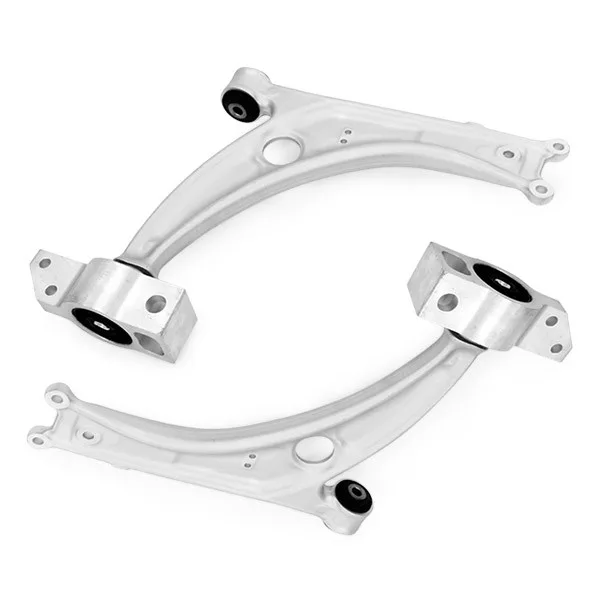When it comes to keeping your vehicle safe and performing at its best, few components are as critical as control arms—especially the lower control arms that form the backbone of your suspension system. With countless suppliers vying for your attention, finding one that aligns with your needs can feel overwhelming. That’s why we’ve put together this guide: to break down the key factors you need to consider, help you evaluate product quality, and highlight what makes a supplier stand out in the market.
Why Choosing the Right Control Arm Supplier Matters
Control arms aren’t just another car part—they directly impact your vehicle’s handling, stability, and safety. A faulty or low-quality control arm can lead to poor steering response, uneven tire wear, or even dangerous suspension failure. That’s why selecting a reliable supplier isn’t just about saving money; it’s about protecting yourself and your vehicle on the road.
Key Factors to Consider When Selecting a Supplier
Choosing a control arm supplier isn’t a decision to rush. Here are the critical factors that should guide your choice:
1. Industry Experience
Look for suppliers with a proven track record. Those who’ve been in the industry for years have honed their craft: they’ve refined manufacturing processes, addressed common pitfalls, and developed a deep understanding of what makes a control arm durable and effective. A long-standing presence often correlates with consistent quality and reliability.

2. Product Diversity
A top-tier supplier should offer a wide range of control arms to fit different makes, models, and even custom needs. Whether you drive a compact car, a truck, or a luxury vehicle, they should have options that match your vehicle’s specifications. Bonus points if they provide both standard replacements and custom-designed control arms for unique or modified vehicles—this flexibility shows they can cater to diverse customer needs.
3. Commitment to Innovation
The automotive industry is always evolving, and the best suppliers stay ahead of the curve. Look for companies that invest in research and development (R&D) to improve their products. Innovations might include lighter materials that reduce unsprung weight, enhanced corrosion resistance, or designs that improve suspension responsiveness. These advancements don’t just boost performance—they often enhance safety, too.
How to Evaluate Control Arm Quality
Quality is non-negotiable when it comes to control arms. Here’s how to assess it:
1. Materials Matter
High-quality control arms are typically made from robust materials like high-grade steel (for strength) or aluminum alloys (for a balance of strength and lightweight performance). Avoid suppliers that use cheap, thin metals or recycled materials of unknown quality—these can warp, crack, or fail under stress, putting you at risk.
2. Manufacturing Standards
The best suppliers adhere to strict manufacturing protocols and quality control checks. Look for certifications like ISO 9001, which ensures consistent quality management systems, or IATF 16949, a standard specific to the automotive industry. These certifications prove the supplier follows global best practices, from design to production.
3. Customer Feedback
Don’t overlook reviews and testimonials. Positive feedback from mechanics, car enthusiasts, or everyday drivers is a strong indicator of reliable products. Pay attention to recurring themes: Do customers praise durability? Are there complaints about premature wear? Negative reviews about fitment issues or poor performance are red flags to investigate further.
The Role of Reputation and Customer Service
A supplier’s reputation is built on more than just good products—it’s about trust. Here’s what to look for:
- Industry Recognition: Awards, partnerships with major automakers, or mentions in automotive publications are signs of credibility.
- Responsive Support: A supplier that answers questions promptly, offers technical guidance (like installation tips), and follows up after a sale shows they care about customer satisfaction.
- Fair Policies: Check their warranty and return policies. Reputable suppliers stand behind their products with generous warranties (often 1–5 years) that cover defects in materials or workmanship. A flexible return policy (e.g., easy returns for incorrect parts) also reflects confidence in their products.
Balancing Price and Value
Price is important, but it shouldn’t be the sole deciding factor. A rock-bottom price might mean cutting corners on materials or manufacturing. Instead, aim for value: a fair price for a high-quality product. When comparing costs:
- Get quotes from multiple suppliers to understand the market range.
- Factor in the warranty—an extra $50 for a part with a 3-year warranty is often smarter than a cheaper part with a 90-day guarantee.
- Look for added perks: free shipping, installation guides, or even partnerships with local mechanics for discounted installation. These extras can save you time and money in the long run.
Expert Tips: Top Control Arm Suppliers to Consider
While the “best” supplier depends on your specific vehicle and needs, one name consistently stands out: JAD. With a reputation for high-quality materials, a vast product lineup (covering everything from vintage cars to modern EVs), and rave reviews for customer service, JAD has earned its spot as a trusted choice. Their commitment to R&D ensures their control arms incorporate the latest design improvements, making them a solid option for both daily drivers and car enthusiasts.
Final Thoughts
Choosing a control arm supplier is about balancing quality, reliability, and value. By focusing on experience, product diversity, innovation, and customer trust, you’ll find a partner that keeps your vehicle’s suspension in top shape—keeping you safe and in control, mile after mile.
Remember: A good control arm isn’t just a part—it’s an investment in your vehicle’s performance and your peace of mind.
